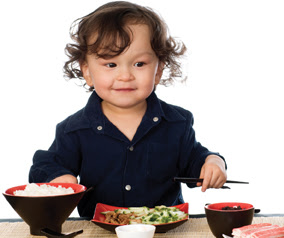If your child’s a picky eater, try removing mealtime pressure. Although your goal is to keep your child well-nourished and healthy, you shouldn’t force her to eat. Children who willingly eat well balanced meals and try a variety of foods have usually been fed with a low-stress approach. From an early age, they’ve been allowed to pick and choose, without pressure, from an assortment of foods. If you create such an atmosphere in your home now, your child’s eating habits will likely improve.
Let your child determine how much she wants to eat. Since you have a realistic idea of her appetite, don’t urge her to eat more than she usually does. She’ll eat enough to keep from being hungry. If you believe she’s underweight or exceptionally small, don’t force her to eat extra food. Instead, discuss your concerns with your pediatrician, who may offer suggestions or otherwise reassure you.
You might try starting her day off with a nutritious milk shake. Put milk, fresh fruit, nonfat ice cream or yogurt, and protein powder in a blender, and whip into a frothy shake. And notice what foods your child’s eaten over several days. If she eats less at one meal, she’ll balance her intake by eating more later in the day. Before a growth spurt, your child’s appetite may increase. And kids’ appetites can vary from meal to meal and day to day.
Generally, prepare foods you know your child will eat, and don’t pressure her to try new foods. Once she feels she can accept or reject something new without angering you, she may be more willing to taste what you offer.
Be careful not to humiliate or tease her about being a picky eater. If you let her know you accept her eating habits, she’ll feel more relaxed at mealtimes. You may be embarrassed if she acts picky when eating at someone else’s house, but you can help ease the pressure there, too. Usually, others will pay no attention to what she eats. If your host asks ahead of time, let her know that your child has a small appetite or eats only certain foods. Most people are understanding of children’s needs.
If you eliminate mealtime stress and your child is still excessively picky, look deeper for reasons. She may feel overly controlled in other areas of her life and may try to exert some power by rejecting food. It’s also possible that she’ll remain a picky eater no matter what you do. Some people, including adults, are just very particular about food.
It takes patience to deal with a picky eater, but the rewards can be great. Once your child believes she has some control over what she eats, both she and you will feel calmer. Then, instead of focusing on what and how much she’s eating, your family can concentrate on enjoying mealtimes together.
Let your child determine how much she wants to eat. Since you have a realistic idea of her appetite, don’t urge her to eat more than she usually does. She’ll eat enough to keep from being hungry. If you believe she’s underweight or exceptionally small, don’t force her to eat extra food. Instead, discuss your concerns with your pediatrician, who may offer suggestions or otherwise reassure you.
You might try starting her day off with a nutritious milk shake. Put milk, fresh fruit, nonfat ice cream or yogurt, and protein powder in a blender, and whip into a frothy shake. And notice what foods your child’s eaten over several days. If she eats less at one meal, she’ll balance her intake by eating more later in the day. Before a growth spurt, your child’s appetite may increase. And kids’ appetites can vary from meal to meal and day to day.
Generally, prepare foods you know your child will eat, and don’t pressure her to try new foods. Once she feels she can accept or reject something new without angering you, she may be more willing to taste what you offer.
Be careful not to humiliate or tease her about being a picky eater. If you let her know you accept her eating habits, she’ll feel more relaxed at mealtimes. You may be embarrassed if she acts picky when eating at someone else’s house, but you can help ease the pressure there, too. Usually, others will pay no attention to what she eats. If your host asks ahead of time, let her know that your child has a small appetite or eats only certain foods. Most people are understanding of children’s needs.
If you eliminate mealtime stress and your child is still excessively picky, look deeper for reasons. She may feel overly controlled in other areas of her life and may try to exert some power by rejecting food. It’s also possible that she’ll remain a picky eater no matter what you do. Some people, including adults, are just very particular about food.
It takes patience to deal with a picky eater, but the rewards can be great. Once your child believes she has some control over what she eats, both she and you will feel calmer. Then, instead of focusing on what and how much she’s eating, your family can concentrate on enjoying mealtimes together.
How can I convince my child to try new foods?
 Reviewed by Unknown
on
7:08 AM
Rating:
Reviewed by Unknown
on
7:08 AM
Rating:
 Reviewed by Unknown
on
7:08 AM
Rating:
Reviewed by Unknown
on
7:08 AM
Rating:



No comments: